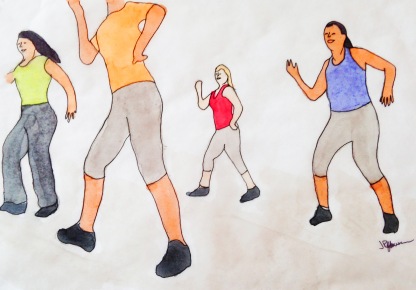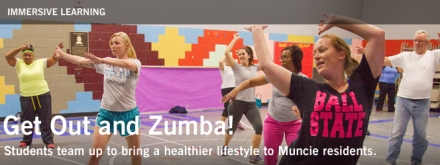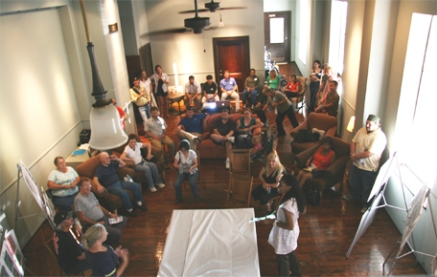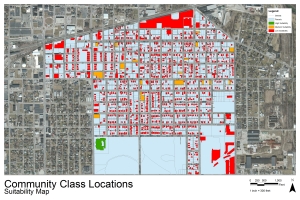The initiative Community Classes relates to the Muncie Action Plan (MAP) Initiative 2: Fostering Collaboration, and specifically to Action 5-Initiating a campaign to recognize and promote higher education’s partnerships in community endeavors. Students, faculty and staff from Muncie’s higher education institutions (especially Ball State University and Ivy Tech) would come together with Industry Neighborhood residents to teach skills and activities to improve quality of life. Creating a schedule of community classes that taught by local Ball State and Ivy Tech faculty and students fosters collaboration between higher education institutions and Muncie residents, because institution members will be able to invest more of their own time within the Muncie community and build relationships.
Based on Industry neighborhood residents’ feedback, a schedule of classes would include home maintenance and repair skills, landscaping and outdoors property skills, computer classes, and fitness classes. Industry Neighborhood is a beautiful historic area of Muncie with character. However, with no city-led initiative to help residents maintain their homes, structures and landscapes often fall into disrepair and lose that character. Older residents who do not use a computer on a daily basis may not know how to use even simple computer programs. Providing them the opportunity to learn and build those skills may help to improve employment opportunities and help residents keep up with what is going on in the world around them. Fitness classes may help residents to become and remain active, ultimately making them healthier and giving them more energy. Through an initiative that teaches neighborhood residents how to maintain the character of their city, helps improve computer literacy, and provides fun ways to be active, homeowners and nearby residents can take pride in the places they live by increasing the overall quality of life for all residents. This creates a sense of ownership and makes the community stronger.
Why this is important
The community classes were a suggestion taken from the Industry Neighborhood Association meeting in January 2015, and given a medium priority level during the March 2015 meeting. Neighborhood residents want to be able to take care of their own properties, learn computer skills that will help them in the workforce, and be active and healthy. Creating a schedule of classes taught by area students, faculty and staff gives the neighborhood opportunities to learn things that residents feel are important but cannot find elsewhere.

Figure 1 – Zumba classes are just one example of possible community classes that could be offered within the Industry Neighborhood. Image: Jessica Pflaumer.
This initiative is important for the Industry neighborhood in order to help build a sense of pride and ownership in neighborhood residents. When an individual is taught a new skill that one can use to improve his/her own situation, (s)he will most likely help others learn the same skill to improve their own situations. As residents learn how to repair and maintain their homes and property, the neighborhood will become a more attractive and inviting place. This could increase property values and overall quality of life within Industry. When individuals learn skills they can take to prospective employers, they are more likely to gain employment in the fields they want, and are able to give back to the community. Fitness classes help residents be more active and healthy, create new friendships and relationships, and provide a sense of fun.
What this will involve
Initiating contact between the Industry Neighborhood Association and local educational institutions is the first step in making classes within the neighborhood a reality. Leaders within the neighborhood association should contact Ball State University and Ivy Tech Community College to determine if there are students, faculty and staff who are interested in leading classes in home maintenance and repair, landscaping, computer skills, and various fitness activities. Students, faculty and staff from the College of Architecture and Planning could provide residents with new skills in home maintenance, repair and landscaping. Instructors of BSU Fit classes at Ball State should be the first point of contact for finding fitness instructors. Ivy Tech students, faculty and staff should be contacted about computer skills classes. Building Better Communities staff at Ball State University will know how to initiate projects through the university that students will be able to gain credit for while building relationships and providing the assistance the neighborhood needs.
The best places for these classes to take place in the neighborhood would be the Unity Center and churches within the Industry neighborhood. These places usually have space available for classes, and are landmarks that neighborhood residents can easily find. Classes could rotate between each location so that one organization is not burdened with hosting all of them. First and foremost, the leaders of the Industry Neighborhood Association and those who run the Unity Center should get in touch with the institutions listed above. It is possible that classes could begin as early as Fall 2015.
Contact information for funding and assistance sources
Building Better Communities
Ball State University
Carmichael Hall (CA), room 104
Muncie, IN 47306
Email: bbc@bsu.edu
Phone: 765-285-2773
Fax: 765-285-1817
Ball State Recreation Services
Ball State University
1700 Neely Ave., SRWC 201A
Muncie, IN 47306
(765) 285-1753
Ivy Tech Community College-Muncie
4301 Cowan Rd.
Muncie, IN 47302
Phone: 888-489-5463
Suitability analysis
The community classes initiative applies to all of the Industry neighborhood. Suitable locations for classes are mapped out on the Community Class Locations suitability map, Figure 2 below. These classes are meant to be available to everyone within the neighborhood, so that each individual may learn new skills and find new activities, as well as ways to socialize. There are several options for locations of these classes. The main location (highlighted in green on the map) should be the Unity Center, next to Heekin Park. This is an existing building where senior and youth events already take place. It is a logical place to hold community classes. If the schedule is too much for the Unity Center, neighborhood churches (highlighted in yellow on the map) can be utilized as extra class space.
Case studies
Case Study One
In 2013, a group of Ball State University students participated in an immersive learning project where they created a community-based nutrition, exercise and childcare program for Muncie residents. The students taught a Zumba class at Muncie’s Buley Community Center. The class was taught twice a week and was free to Muncie residents. After the class, participants were introduced to healthy meal ideas that were planned and prepared by dietetic majors. The group received a $2,000 grant from the Indiana Alliance for Physical Education, Recreation and Dance to support the program, with most of the money supporting local residents who wished to become certified Zumba instructors. This is something that can easily be replicated in the Industry Neighborhood, utilizing the same grant program as well as Building Better Communities.

Figure 2 – Ball State University students lead a Zumba course at the Buley Center in Munice. Image Source
Source: http://cms.bsu.edu/features/global/immersivelearning/get-out-and-zumba
Case Study Two
Clemson University provides students with an opportunity to give back to the community by teaching area residents new skills while earning course credit through service learning classes. The students enrolled in an agricultural education course visit a Clemson-area retirement community and become the teachers in a class where the community residents learn a computer skill that is determined at the time of the meeting. This provides the university students a chance to form relationships with older generations and with Clemson area residents, outside of the relationships that they form on campus. It also provides the older residents a chance to interact with younger generations. These opportunities help to build strong relationships and reduce generational differences.
Ball State University and Ivy Tech can easily replicate this kind of service-learning activity that requires little money, yet provides unlimited benefits for students and residents. Campus leaders would have to approve such courses as credits for students, and professors would have to be willing to act as advisors for the course. It may take time to go through the entire process, but this kind of immersive learning would benefit both students and residents greatly.

Figure 3 – Students from Clemson University participate in a service-learning project. Image Source.
Source: http://newsstand.clemson.edu/mediarelations/clemson-service-learning-students-teach-senior-citizens/

